#of her duty to the universe and beyond and whatever . to blend in and keep the Family off their tails
Explore tagged Tumblr posts
Text
i think human nature/family of blood is a really good two parter in how it manages to show how full of shit ten is 🫶
#look . i LOVE ten . esp whatevers going on w him in s3 he's horrible and i like that#but just !! martha :(#its so incredibly unfair to martha he doesnt unleash his wrath on the Family he chooses to hide instead and okay yeah fair#and sure u can say the tardis chose the setting and time period for them to hide in but like#did that not filter in to his calculations he went through all that turned himself human put his friendship with martha to the test in#the worst way possible. knowing she wouldn't let herself leave him even if he was Abhorrent towards her (and he was) because#of her duty to the universe and beyond and whatever . to blend in and keep the Family off their tails#and she's put in a demeaning position and degraded and even he doesn't seem to care much for her but she still hangs on#and then in the end its like its all for naught. all that pain and suffering martha went through being the only one w her wits about her#he had the capacity to deal w the threat the whole time he had the ability to dole out a horrible punishment he could definitely#have dealt with them a different way than that too .#and instead in his quest to be the bigger person he ends up putting martha through the horrors and then#does the same with the Family anyway ! i dont think he can ever tell her how harshly he dealt with them#surely this isnt an original thought im just thinking Way too much about blue moon by niki#he Does care more about being good than being good to her specifically !! and its so upsetting theyre so volatile i miss them#its more complicated than that sure but at the same time. it sort of isnt .#anyway martha jones my love my life u deserved at least a billion apologies alongside the thanks like god . whats wrong w him#oh and also he wants to move on without properly talking about it . act as if it never happened#like girl be fucking considerate for ONCE she just went through a personal hell for you !!! how insanely lonely she must of been#i dont believe martha ever let him just brush past it w no acknowledgement like yes i think she definitely didnt want to discuss the#accidental confession but i Do think she would sit him down to finally get him to Accept he cant just take her wherever in the past#if he's not ready to look out for her . its a vital conversation i think they need to have otherwise martha would just walk out there#not even love could make her stay through that its been established already she has the strength to try walk away#and also to try and but through his bullshit and demand answers . and here more than ever she deserves his acknowledgement and he Knows it
10 notes
·
View notes
Text
I just noticed that Anamnesis passed 15,000 hits! To celebrate, here are some lines I wrote for it that didn't quite work, but that I saved in case I could use them later (I couldn't).
Deleted Lines
Eren longed to see the stars again but the constellations he missed most were the ones that sparkled in Mikasa's eyes.
***
“We could just leave him,” suggested Eren, tapping his cartridge cap. The chemicals inside helped a lot, but even they couldn't cure him of being petty.
***
Mikasa frowned when yet another ad for Quantum Zee began to play, the familiar lullaby jingle accompanying the voice actor’s intimate, knowing murmur. She shoved her earbuds into her ears, turning on her music quickly to drown out the words. She didn’t want to think about this.
***
Eren grimaced to himself, irritated that he’d revealed the macabre underpinnings of his psyche.
***
"Hey, sex machine," purred a voice.
***
of the climate control grid malfunctioning overhead, dooming her region to the desolation of an eternal summer.
***
He wasn't young, like them. Meren had been watching him, too, and he stood as though his body was a burden he had borne for years, one that was beginning to weigh him down.
***
"If you break his heart, I will destroy everything you have ever loved and make sure that you are never happy again. If he breaks yours, call me," Historia winked.
***
her dark gaze as lush as black velvet.
***
Eren knew that his main concern should be all the stuff about unknown persons bringing Erens over from other universes, but he wasn't from another universe and despite the efficacy of the new chemical blend he was on, which he still needed to go get replenished because he could feel his mental health declining, he didn't really care much if he lived or died.
***
As an Eren, he could say beyond a shadow of a doubt that there was no way he or any of his other selves would let anything happen to any of her. It was impossible. He was so invested in her well-being that he was still kind of freaking out about how the other Mikasa's labor would go and he wasn't even going to be in the same universe to help.
***
He didn’t want to die. Not now. Not now that he was doing better and he’d found a chemical cocktail that worked and might even keep working to the point that he could get genetic surgery to start making them himself. Not now that he had someone he wanted to spend his life with.
***
Her heartbeat took on a frantic clamor as she considered his involvement, whether he was safe. She told herself her fear for him was because he had become such a close friend over the past several weeks. She was sure she would be equally distraught if it were Annie or Sasha, or even Reiner or Ymir. But, despite her insistence to the contrary, her worry for Eren was different, more shrill; her desire to keep him safe from harm was laced with the sharp desperation of self-preservation. She was already barely alive. What would become of her if he disappeared or died? What if they damaged him, like she had been damaged? She knew quite well how swiftly and irreparably someone could fracture another person, each crack fissuring until the entire structure of a personality crumbled into something unrecognizable.
***
"True love means accepting someone for their flaws."
"She doesn't have flaws."
"She doesn't do anything that annoys you?"
"If she annoys me, that's a problem with me, not her."
***
“We’re on a date?” Eren asked, his mood lifting somewhat.
Mikasa’s eyes darted to him, her lips tugging into a frown. “I… I mean, I asked you to come with me tonight, and… and you were holding my hand over there, so I thought…” She ducked her head, letting her hair fall in front of her face so Eren couldn’t see her blush. “I guess I don’t really know what constitutes a date.”
Eren slipped his fingers through hers.
***
Erwin didn’t have to schedule himself for night duty, but he did it because he was fair. However, he did whatever he wanted between calls because he was the captain and who was going to tell him not to? He accepted his ice cream cone and left a nice tip in the jar, then strolled down the sidewalk towards the karaoke bar to see if anyone was being rowdy.
***
What you’ve done doesn’t change who you are, right?”
***
But then he’d met Mikasa, and in an instant there was no longer any question of whether he was capable of love, only whether he could survive without her. "Yes,” he said.
***
boring into her with a searing gentleness
***
he craved her so violently that he was powerless against himself, desperate to bask in the light of even the palest imitations for as long as he could bear the counterfeit glow
***
asked Mikasa, more brusquely than she had intended, her heartbeat as rapid and devastating as machine gun fire.
***
her fingers digging into his arm, shackling him to her.
***
Eren’s heart caved in.
***
“I’m in love with you, Mikasa,” said Eren.
She froze, her entire body going rigid in his arms.
“I’m sorry!” he gasped, releasing her, his face creased with panic. “I didn’t mean to say it. It was supposed to stay in my head. I’m sorry! I’m sorry!”
She began to shake, her muscles so tense that he could see them straining against her skin. “I’m sorry,” she squeaked.
***
“Why are you sad, Hange?” Levi asked.
Hange shrugged. “Just mostly because I feel like no one understands me,” they said. “I’m a strange bird, Levi. And I know it.”
***
"Jean told me you were a troublemaker," Mikasa said, her eyes shining.
"That fucker! When?" Eren demanded.
"Right when we first met," said Mikasa. "I
***
Not a line, I’m just disappointed I didn’t find a good place to have Meren say something was “urchy” instead of “shitty”.
***
, her jaw setting. “It would actually be kind of nice not having to worry about staying on my bastard father, Rod Reiss’, good side anymore.” Her angelic blue eyes hardened, an evil glint sparking inside them. “I mean, imagine the damage I could do to the family if I decided to stop pretending to be Daddy’s perfect little bastard princess.” Armin cocked his head and Historia grinned.
***
Ymir's forehead creased as she pushed the salt back and forth in front of her. A brief, residual rankle of jealousy prickled behind her ribs, but it was gone almost before she realized it was there, a mere echo of feelings long past that were replaced with a golden warmth when Historia appeared and plunked a wire number holder clip down on the tabletop and slid into the chair next to Ymir’s, her blue eyes sparkling like sunlit dew and her cheeks as pink as geraniums.
***
“He keeps trying to get me to try it, but I want a port like I want a hole in my head.” He cocked his head. “Oh, hey,” he laughed.
Mikasa grinned.
Mikasa wrinkled her nose back. “It seems like you and I have the real life version.”
Eren laughed.
14 notes
·
View notes
Text
KW 2021: The Sea & The Sky
Day 7 for Kataang Week 2021 hosted by @kataang-week with the prompt The Sea & The Sky!
Don't mind me crying in the corner that Kataang Week is basically over, but anyways I'm super proud of this last oneshot and hope you all enjoy it!
Links: AO3 | FF.net
Summary: Another year, another, another week of prompts celebrating our favorite couple. Kataang Week 2021 Day 7: The Sea & The Sky. Katara was the sea, Aang was the sky, destined to meet at the horizon where they were bound together for all eternity.
Word Count: 1.7K (barely)
The sea and sky, two entities as old as time itself. In some ways, as contrasting as the night and day, and in others, perfect reflections of one another.
The sea has always been below the sky, left to gaze upon the brilliance of the celestial bodies embedded in it for all eternity and reflecting the light of the bright stars beyond.
The sky has always been above the sea, forever peering down into its depths for the miracles and mysteries hidden beneath, and guiding its steady waves as they crash upon the shores of the Earth.
The sea is the reason the azure sky is adorned with feathery white wisps floating high above the ground, and the sky, in turn, fills the oceans and floods the rivers with the very liquid that makes survival possible.
The sea fosters life beneath its steady, undulating surface. It holds flora and fauna of all shapes, colors, and sizes, and it was a point of fascination for the sky. The sky, in all its glory, could not sustain anything for long. Even the birds that rode over its swift breezes had to eventually land somewhere below. And yet, the sky was free, a vast expanse of space that extended beyond what the sea could ever imagine to be possible. It wasn’t shackled by the chains of the planet, and the sea almost envied it.
In the days of old, when sailors ruled the seas, the ocean and her gentle waves would push them across great stretches of nothingness, while the sky and his stars would aid in guiding them on their journeys. Without the sky, those explorers would be lost at sea, and without the sea, their ambitions would remain sky-high with their dreams of traveling the world doomed to remain just that- dreams.
The sea and the sky have always been connected. Together, they make a thriving world possible. And so it follows that those so closely bonded to their elements, Aang and Katara, would be similarly linked by the fabric of space and time.
Though he was the Avatar, Aang’s native element was that of air. He preferred to soar on his glider high above the clouds, and gravity was a laughable concept to him. True to his airbending disposition, Aang’s natural inclinations were to evade conflict and obstacles in order to move forward, like a leaf on the wind.
Katara was born in the Southern Water Tribe, surrounded by ice, glaciers, and the frigid seas of the South Pole. She wielded the element of water, adapting and accepting things as they came since water was the element of change. She would experience swells of emotion similar to the waves, but she always came down into a steady balance, an ebb and flow just like tides.
Aang and Katara were not each other’s antithesis, far from it actually, but rather each other’s complements. Had they been such stark opposites, their relationship would’ve been much more turbulent, having the highest of highs but also the lowest of lows. They needed not a sharp contrast but rather a soft blend to allow them to communicate with and learn from one another. It was this that allowed them to work so well.
When Katara was firm and unyielding like a tsunami approaching the shore, Aang accepted her stance and often strengthened it. Consequently, if the airbender was flighty and indecisive, Katara would be there to ground him and guide him to something he felt confident in.
Katara was Aang’s earthly tether. When his head drifted up into the clouds, she pulled him back to the real world and allowed him to guide the four nations into an era of peace and prosperity. On the other hand, Aang showed Katara true freedom and what being unrestrained felt like. He brought her up with him on his glider and taught her to defy nature’s laws, to not be afraid to take exhilarating risks, and to keep her ambitions sky-high.
Their worlds collided like the brilliance of colors created as the sun set over the horizon, gradually leaving the realm of the sky and sinking into the sea. Some of their traits reflected each other like the sun’s rays on the sparkling surface of the water, and the others melded together well to make the glorious gradient that streaked the sky as night fell. Together, Aang and Katara created a rich harmony filled with overtones that mirrored the depth of their connection.
When they first met, that instant link, the bond that tied them together, was remarkably evident to all those around them. It was absolutely undeniable.
Though Sokka had mostly been joking when he had called Aang Katara’s boyfriend, there were still some astute observations lying under his exaggerated comment. Sokka knew his sister. She didn’t take to people too well, he had noticed over the years. Katara was protective, almost overly so, of the people she loved, and it was hard for her to let people in.
And yet here was Aang, a boy whom she had quite literally taken into her open arms without so much as a blink of hesitation, a boy whom she was ready to leave her tribe, everything and everyone she had ever known, and travel across the world for. It seemed so out of character. Katara didn’t usually make sense to her brother, but this was something different, something special.
Even Gran Gran had taken notice of the unique energy between them. “Aang is the Avatar,” she had told the Water Tribe siblings. “He is the world's only chance. You both found him for a reason. Now your destinies are intertwined with his,” and she was right.
That day, Aang and Katara had forged a connection that wouldn’t, that couldn’t, ever be severed. Breaking him out of the iceberg had been the catalyst for the rest of their lives together. Their adventures following only served to deepen and strengthen that link, allowing them to fall wholly and completely for one another and experience a love they didn’t know was possible.
Visiting Aunt Wu was the first time Katara had really stopped to consider how far their bond went and the strength of her feelings for Aang. She knew they had something unique, something exceptional, but she hadn’t ever thought it could run that deep. “The man you’re going to marry… I can see that he is a very powerful bender.” It made sense, didn’t it? The boy who had changed her life for the better would grow to be the man that she would spend the rest of her life with.
Their kiss in the Cave of the Lovers only further cemented the idea in her head, and a part of her began to believe that their meeting was fate, just like the tale of Oma and Shu. Aang, while still reeling from embarrassment at some of his words (“I’m saying I’d rather kiss you than die, that’s a compliment!”), also began to have similar thoughts, thinking that maybe they too had parallels to the starcrossed lovers and that the love that they shared would one day too be immortalized in legend.
The battle in the catacombs underneath Ba Sing Se seemed like an all too abrupt end to their story. It simply didn’t feel real. How could their link just have been cut off like that? No, Katara wasn’t ready to accept it. She couldn’t accept it. It went against the laws of the universe, it wasn’t possible.
She was going to do whatever it took to keep him there with her, and she did. She brought Aang back from the spirit world through the purest of love, light, and determination, and she made it her duty to never let such a thing happen again.
It was what allowed them to fulfill their roles as the Avatar and his waterbending master at Sozin’s Comet and have their kiss afterward, the early buddings of a relationship that would last a lifetime. Years later, they would go on to pronounce that love to all their friends and family, but, for now, they were more than just their fates.
Just as Aang was able to manipulate water along with his primary element of air, the heavens held clouds in its vast expanse of sky, connecting it to the sea. The sea sent water up in the form of vapor to create those fluffy masses above, and the sky releases the water that the clouds hold in torrents of rain back down to the ground, tying the two together in an endless cycle.
Similarly, waterbending was one of the many things that bound Aang and Katara. It was the reason they had met, the reason Katara was able to break Aang out of that iceberg, and it was the reason they embarked on their epic journey to the North Pole- to learn from the masters and even become ones themselves.
Waterbending linked them as sifu and pupil, strengthening their bond. Without waterbending, Aang may have never realized that fateful day of her adjusting his form of the effect she had on him, the full intensity of the pull, the attraction she held in his eyes.
Waterbending had made Katara especially attuned to the rhythm of the waves rising and falling, and it didn’t long for her to notice how her and Aang’s dynamic reflected it, ebbing and flowing in a delicate yet harmonious balance.
Their meeting had been fate, an event necessary for the survival of the world itself, but that did not define them. With each other, they were not their destinies. They were not the Avatar and his waterbending master, nor were they the beacon of hope for the future of the Air Nation.
No, they were Aang and Katara, two people who had defied all odds, overcome all obstacles, and quite literally gone to the Spirit World and back all in the name of love. They were not the heroes who had saved the world, but soulmates, fated just as the sky and the sea were to meet at their own horizon. They were two people irreversibly linked to each other then, now, and till the end of time itself.
#kataang week#kataang week 2021#kataangtag#kataang#kataang fanfic#the sea and the sky#aang#katara#aang x katara#atla fanfiction#soulmates#bc yes
22 notes
·
View notes
Photo
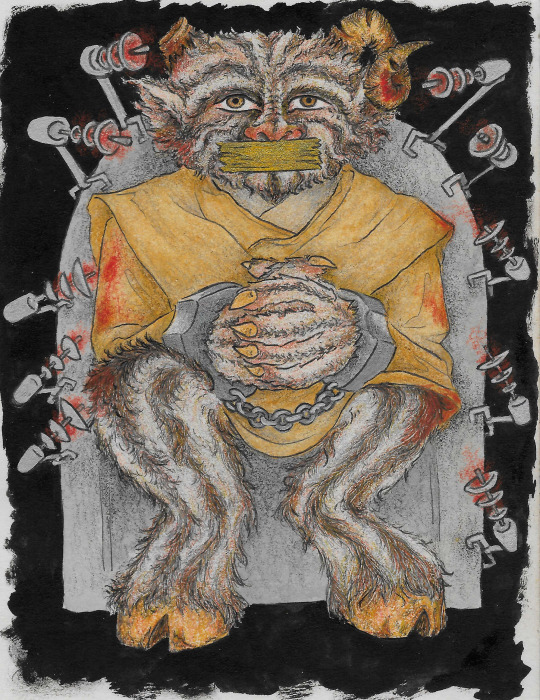
Knightkiller: Anakin and Obi-Wan’s First Adventure
Chapter 6: Tila Juna
Word Count: 1659 Links: Chapter 1, Table of Contents
* * *
As he is meditating, several guards burst through the curtain into Obi-Wan's room.
“Alright, Jedi, what did you do?” asks a Rodian.
“Do?”
“Where is your boy?” asks an Ithorian in his steady, peculiar language, which the cosmopolitan scholar of course understands perfectly.
“Oh, dear. I thought he was with you!”
The Rodian smacks his insolent guts with her staff. “He's run off! What did you tell him? What did you give him?”
“Nothing. I know nothing about this station. And I haven't left this room.”
The Rodian whacks him on the head. “Sneaky Jedi rat.”
The Ithorian wearily halts his coworker’s attack. “Juna’s girl will work just as well for your death matches. Your boy was only ever extra bait. Now he has proven himself to be only trouble.” His gaze is imperious and bland. “When we find him, we shoot on sight. Then we’ll slice off his head before you can pull any of your magic tricks, and divide the spoils between the upper officers.”
“You underestimate him. He cannot be found if he doesn't want to be.”
“We shall see,” the third guard, a Zabrak, threatens.
Obi-Wan feels no fear at her appearance. She looks far more like his Zabrak friend Master Koth than the Sith. No one looks like the Sith.
But, for Anakin, he feels great fear. What did Anakin do? Where did he go? What is he thinking? Anakin amazed Obi-Wan with his knowledge of these low-lives. But on his own, in a place like this? With all the street smarts in the world, he won’t last an hour.
I have lost the Chosen One. Qui-Gon would kill me.
Nevertheless, the bold knight tuts and laughs. “You would love to hear our master plan, wouldn't you? Ah. I pity you all for what's about to happen to you and your little tournament.”
The Rodian hits him again.
“Alright, then,” says Obi-Wan, grimacing. “If you want answers, you'd better bring in your boss. I'll only talk to Knightkiller.”
“Not likely,” the Ithorian responds. “You'll only fight Knightkiller once you’ve defeated all the others. So many of our athletes are paying through their noses for the chance to kill you.”
“In that case, please do drop a line if my Padawan turns up.”
The guards leave, irritated.
A minute later, they return, now practically hysterical.
“Alright!” yells the Rodian. “Something IS up! Where's the girl, Jedi?!”
“What girl?”
“Juna's Padawan!”
“Goodness gracious. Can't you keep a better eye on us?”
The Rodian moves to hit him again, but stops since he doesn't seem affected. “We know you're behind this.”
“It's almost like the most highly-trained warriors in the galaxy can just slip through your nasty little fingers.”
She hits him again.
“The teachers will pay for their students' disobedience,” says the Zabrak, who pulls the other two guards out of the room and slams the door.
The warriors beside Obi-Wan have gone quiet, intimidated by his taunting, in awe of his unknown abilities and those of the other three Jedi. Obi-Wan wonders how long that awe will last, if he can't escape as the clearly more competent children did.
Suddenly, the door to the arena opens up. He hears the crowd chanting his name. When he steps out, his arm shielding the brightness from his eyes, they all cheer for him. He feels disgusted to be a source of admiration for people like this, for doing the worst thing in the world. The sand underfoot is congealed with spots of blood. An attendant hands him a clean sword.
As the announcer speaks, and Obi-Wan's eyes adjust to the light, he sees that his opponent is that boyfriend-killer Tiango. The Mandalorian flexes and poses for the audience, but they are not swayed in their support for Obi-Wan.
In the same chair on which they had bound Anakin, now they have bound Master Juna. Where Anakin was terrified, Juna is peaceful, even content. She is a tall, large, fuzzy alien, a Lollian. Centuries ago, so he’d been told, her fur was bright orange with brown stripes, but he has only ever known her to be gray and silver. One of the two horns curling around her head is broken, but that was not from this death game; it has been like that as long as Obi-Wan can remember. The woman seems entirely unfazed and unharmed by the experience. He knows this cannot be remotely true, and yet she hides her pain so well -- or else, the Force is so strong with her that she sits on a plane of existence above it all, unbothered. She nods at him and he feels as one blessed.
Obi-Wan instinctively reaches out for his own master. The years of physical peril and spiritual confusion in the life of a Padawan trained Obi-Wan to reach out to Qui-Gon as an immediate reaction, utterly replacing his natural fight-or-flight instinct, the ways of the Jedi overcoming evolution itself.
But of course he cannot reach him. Grief strikes him harder than any of these crooks could, harder than even any Sith could.
He's got to replace that instinct himself, this time; he's got to do it himself. There's someone else he has to reach for now, someone who feels entirely different, strange, and small, still smarting from a bad first impression. And -- more than that -- he, Obi-Wan, has got to be ready for Anakin whenever Anakin needs him, for whatever, just as his master was for him. The weight of this responsibility could crush the young man.
Anakin is here in the audience. Obi-Wan can sense his presence.
Obi-Wan glances over the crowd -- Tiango seems to be posturing still -- but he can’t locate his Padawan. Anakin seems panicked, urgent. He has seen Tiango kill before, kill someone he cared for. He must be worried Tiango will be too much for Obi-Wan to handle. But Obi-Wan took down several Yoroo Soldiers less than one year ago. Sure, they're not an easy fight, but he knows their tricks; he knows their evil cybernetic enhancements.
Chahlee sends a laser, suddenly, at Obi-Wan, from his blaster-arm. Obi-Wan deflects it deftly, causing the audience to gasp, but the impact bends his vibroblade. Obi-Wan stares at it. He forgot they did that.
* * *
Freed, with the help of Fenn Gallowk and his acid-blaster, on the upper floor of the space station, Anakin knows he needs to hide his Jedi robe and Padawan hair. These people might even know his face. He got lucky with Fenn -- the next person who recognizes him from the Boonta Eve race probably won't give Anakin a chance to talk it out.
Anakin wonders if anyone here bet ON him. He doubts it. But it's a big galaxy, and maybe someone out there took a chance on him.
He remembers Qui-Gon's confident face, and how the man had picked him up to put him into the podracer, and then picked him out of it in the end and carried him on his shoulders. If Anakin is honest with himself, he knows Qui-Gon was, really, the only person who believed in him. His mom, Padme, and Jar Jar had supported him, and hoped beyond hope he would make it out alive. But Qui-Gon was the only one, probably in the whole universe, who believed -- foresaw, even -- that Anakin would win.
No, that's not true. Anakin had believed that too. How could he fail, when they all needed him so badly? When there was absolutely no other way, no choice?
Anakin hurries down the prison hall. The cells are closed on all sides; it is impossible to see who is being kept in them. He hides behind the flap of a garbage chute as a security droid passes; he sits with his back and legs pressed against opposite sides of the chute, careful not to fall down into who-knows-where. It smells awful. He jumps back into the hallway and finds the door to the public area ajar. He pushes his way out and tries to blend in with the crowd, keeping his head down and arms crossed around his blaster and the front of his robe.
Recharging: 3%.
Of all the blasters he could have stolen...
Just around the corner, he sees a big green alien at a desk and, behind them, a coat-check. Anakin ducks under the desk and sneaks into the room full of these criminals’ coats and cloaks. It smells even worse than the garbage chute.
He holds his nose and searches for something bulky, obscuring, and somewhat in his size. He finds a fur cloak, the pelt of a pink monster with its horned face still attached. He puts it on and ties the lower part around his waist so it doesn't drag on the floor. With the hood up, he can hide his own face inside the monster's mouth. He hides the blaster in the copious folds of fur.
Maneuverable? No. Inconspicuous? No. Unrecognizable, and able to hide his weapon? Yes.
Exciting? Yes!
Now he's got to get to Obi-Wan. Obi-Wan will know what to do. Even if he doesn't, it's Anakin's duty to be at Obi-Wan's side.
The loudspeakers announce the fight between Obi-Wan and Chahlee Tiango. Anakin feels afraid, and tells himself Jedi do not feel afraid, but it doesn’t help.
He sneaks back out from under the desk and finds two large furry aliens on the way into the arena, arguing with each other and paying no attention to anyone. He sticks close to them and pretends they are his parents. Once the hairy family has entered the arena through this upper-floor entrance, Anakin separates from them and waddles through the balcony seats, trying to get as close to the arena as he can. He sees Obi-Wan and the Mando have already begun to fight. He takes a seat on the floor at the very front of the balcony and holds onto the bars with his shivering hands.
“Come on, Master.”
Chapter 7: Jane
#my story#my art#star wars#knightkiller: anakin and obi-wan's first adventure#obi-wan kenobi#tila juna#anakin skywalker#scifi#adventure
4 notes
·
View notes
Text
Prologue/Introduction
In the beginning…
God created the heavens and the earth. And the earth was without form, and void; and darkness was upon the face of the deep.
And the Spirit of God moved upon the face of the waters.
And God said, “Let there be light”: and there was light. And God saw the light, that it was good: and God divided the light from the darkness.
Or so the story of Creation goes…
Same, too, to say, that this was also the story of Michael’s first triumph against Samael’s Great Rebellion.
They say that the Bible is the Word of God, His Story, and His message to humanity, however, many theologians never fully understand all the words written by the great apostles, prophets and scribes of God.
The writer themselves were puzzled with every word that came from the inspiration of God through their writing.
------------------------------ ------------------------------
Facing with the punishment of being banned from the promised land of Canaan, the writer of the first five books, the “Pentateuch”, Moses, the great leader of the Exodus of the Israelites from Egypt, determined to himself that he will write and record, scribe what the Lord inspires him to write.
He began with the words, “In the beginning…” notating the answer to the large mystery of ‘Where did everything started from?’
From Genesis to Exodus, how they escaped slavery from Egypt, and Leviticus and Numbers and Deuteronomy, Moses played a large role in starting writing the original manuscript of the Holy Book.
What is common on these books are that they present God’s power to the human realm, His influence, physically, on the Earth’s fundamental laws. The impossible made possible, the unthinkable made pursuable, and the improbable proven.
Little do we know about the spiritual creatures that help conjure these so-called ‘miracles’, or as the humans call it, ‘abnormalities’.
The power to bend reality into your will is something that cannot be achieved by mere human. The humans do have their wild imagination – concoctions to a colourful and advancing world, however, they can only so little to so much with their own bare hands and feet.
They are limited and cased into the laws of physics and the laws of the universe, whatever they can produce beyond those boundaries were theorized to be with the help of spiritual beings upon the will of God.
These spiritual beings took on faces similar to human, but were theorized to be genderless, their form changes according to their purpose and each of them has a different power that can bend even nature itself.
In reality, the appearance of each was uncommon to the human eyes, and mind, looking like sword, flames, ray of light, wheel, beast, and winged creatures.
They operated in the shadows, perhaps, secret agents, fashioned by God, effortlessly blending into the crowd to create opportunities for trials and temptations, and visited humanity time and time again in a particular way that sends shivers down your spine.
------------------------------
------------------------------
Moses was an Egyptian scholar. Years of his life focused on grooming and preparing him to be one of the great pillars of the dynasty of Egypt, along with his father and brother, the Pharaoh and prince regent.
In the middle of the great pyramids’ construction, some believed that Moses was the chief engineer in building those ginormous symbol of wealth and power of the Egyptian monarchs and elites.
Moses, the brother of the prince, standing in the midst of the crowd, proud of his lineage, and assisting his brother, the regent, on his projects and plans for the future of the kingdom.
He was always at the top of his game. His teachers taught him manners of the royalty, work ethics, and their religious gods, but nothing from his prestige education and training has prepared him for the upcoming events.
“Stop! Please!” An Israelite girl pleaded and kneeled in front of the Egyptian soldier as her salty sweat runs down her brows.
The slaves have been tirelessly put to work for almost seven days now by one of the nobles who felt that he would die at any moment.
Soldiers were assigned to monitor each and every slave to work and accomplish the great task of mounting one of the greatest pyramids of all time.
As women and the children were assigned to distribute food and water, the men, the older ones, and the young ones, were assigned to the heavy duty of creating blocks of mud and bringing them to the construction.
SFX: WAPOOSH! The sound of the whip echoed in the valley.
The Egyptian soldier just wouldn’t stop.
She looked away every whip, the sight of her grandfather, whipped to death for falling behind the line, blood oozes out of the pores of his back, blending in the mud and straw where the slave drenched as he fell behind the line, rashes start to appear as the straw’s unbearable dryness produced the itching reddish appearance as it touched and the heat torched the old man’s skin.
Moses was sensitive to these kinds of things, he doesn’t remember ever getting to know a slave, nor does he know that he was from one of the slaves, but his heart ached every time a slave cried out, his mind exploded in frustration every time he sees someone lashed to death.
He did not fully understand why, but his body followed his heart and mind, because of this, most of the Senate did not like Moses.
To them, he looked weak, sympathizing with the slaves. Though, the current Pharaoh keeps him in his heart as his son, and the current regent treats him like a blood-brother, you will notice a difference in heart.
“Father, I’d like a slave to be in my quarters.” The first time he heard this from his brother, the prince regent, it immediately broke his heart.
He realized he is still too weak to do anything, but now, now, that he’s the chief engineer, maybe, maybe, he thought, Maybe I can do something about this!
He quickly rushed to the aid of the old man with a collapsed lung, the soldier continued to whip the man to death until he submitted, wobbling standing up and tried to barely carry his load.
Of course, he wouldn’t be able to stand up - you’re whipping him to death!
He thought this through…
But it was too late, he grabbed the soldier’s wrist to stop, but the old man collapsed again and was no longer breathing, his unmoving body lay still half-buried in the sand and mud and the straw that he grew up to pick up in.
I thought I can save him.
He expected a wave of rejoicing of gratitude from the slaves, instead, a wild, deafening screech from the weeping of the granddaughter of the old man echoed through the desert.
He couldn’t comfort the girl, he couldn’t scold the soldier, he couldn’t punish the abuser, and protect the weak, stuck in the middle, he was faced with the greatest enemy of his life – the cruelty of his own father, or so he thought.
That night, determined to get justice, and to be the defender of the weak, the sneaky vigilante snuck through the darkness and struck quickly in the moonlight.
“No, please, don’t kill me.” The soldier appealed with his life.
But the more he beseeched for mercy, the more Moses got agitated, he remembered how the little girl implored for his grandfather’s life, and for that, he struck the blows even harder and harder, until there’s no recognizable feature in the man’s face.
A sigh of relief rushed down his spine as he finished the task, he succeeded in sending that soldier’s soul to hell’s hottest and finest rooms.
The relief quickly brushed down his face, and terror and panic soon came charging in. The clouds that covered the moonlight passed on and as the light hit the sand, his murder handiwork reflected in his eyes. His hands covered in blackish hard liquid, as the blood dried out immediately in the cold of the night.
What have I done?
Alas, he thought he was doing a righteous task by taking justice in his own hands, but what he took was his own innocence, and send it off to hell.
Sand! I’ll… I’ll bury him in the sand!
He quickly scooped his bloodied hands in the sand, cold and rough, gasping for air as he dashed to bury the body in the middle of nowhere. He knew that no secret in this world that will never be revealed, but hoped at the least that his family doesn’t find out.
As he was finishing his burial, his eyes nervously darted and scoped around like a cornered impala, waiting for the lion to strike.
There’s no one. Good.
He speedily head back to the palace, near at the river’s bank, and washed off his body and threw his clothes, the river stowed away with the bloodied evidence of his crime.
He looked at the silver moon, it was not a good sight. His eyes filled with the red-stained blood that splashed around while he bludgeoned the soldier to death with a sharp rock.
He wanted to go back in time, to undo what he did, but it’s too late, it’s already done.
Forgiveness from a god was familiar to Moses, they have customs and rituals indicated in their history paintings and drawings, but this was the first time he sought forgiveness from the God of the Israelites.
God, if you can hear me, please… please forgive me. I’ve been good, and I’ve helped many of your people. I hope You can help me this time.
Every one of the Egyptians was well acquainted with each other, though they treated the Israelites as slaves, their definition of family was still pretty close, hence, the next morning, the family of the soldier petitioned a searching party from the palace.
Alarmed by the missing soldier report, the Pharaoh quickly dispatched a team to rummage through the desert and the nearest kilometres of the borders.
And within that day, a few volunteers discovered a body, unrecognizable, near the borders of Egypt.
So… so fast, I… I need to get out of here.
God wanted to help Moses, though he murdered a man in the name of revenge, he was still the chosen deliverer of the Israelites out of Egypt, that was His plan.
Then…
God liberated Moses all from the anchor of his family, the pressure of Egypt and from his crime.
“Aren’t you the one who killed this man? Are you not an Egyptian as well? Why did you kill him?”
Someone whispered in the crowd.
Moses darted his eyes through the crowd, there was no one.
Who’s talking, then… who?
An old man has his back turned from Moses, and that’s when his heart spoke to him, Approach the old man, approach him.
And he did.
That voice steered him to something that he could not fathom, at the least for that moment, or for the next forty years.
He frantically stretched out his arms across the crowd and reached the old man’s shoulder.
“Wait…”
His face quickly turned pale and devoid of any colour, as if the blood came rushing out, the old man’s face, it was the dead old man, the unmoving old man, whipped to death, bloodied with his back, and rashes in his whole body.
“You killed him! You killed your fellow Egyptian! He killed him! I saw him last night!” The outlandish accusations of the old man seemed to be believable to the people around Moses.
The Chief of the Army quickly posed a wanted poster and notice for the head of Moses, the man who killed an Egyptian.
How is this possible? That old man already died, I avenged him.
His thoughts got scrambled quickly as puzzle as he packed up his things to escape justice for his murder charges.
Pressed by the elites and nobles, the Pharaoh, issued a warrant to arrest and punish Moses for the murder charges.
I have no other choice but go.
MOSES! MOSES! The echoing soldiers and army ready to arrest him were now threading to the gates of Egypt.
He quickly marched on to the death of the desert to escape his pursuers.
*Huff, Huff*
This isn’t working, this isn’t what I wanted. I only wanted freedom for the slaves. Fair treatment for everyone, how did it end up this way?
It’s too late, he was already miles away from the kingdom, in the vast desert. At least he knew how to find an oasis or something similar in this time of the day.
Exhausted, lingering between life and death, Moses continued to march on at the cold of the night, his eyes barren of any life and hope, not knowing where to go, what to do, and if there is any future ahead of all of this.
Then…
SFX: Thud, thud
His knee gave out, weakness due to thirst spread throughout his body and he suddenly fell on his knees, then his face on the sand.
It’s as if he had lost all hope, closing his eyes to oblivion, his ears started tingling, there’s sound coming from somewhere.
“Father, father…”
The faintest sound of a lady woke him right up, his eyes dilated of joy and hope. He pulled out his arms from the sand, and pushed his body upwards, along with his torso and his legs.
Flailing like his legs were going to give out, he struggled to find the sound.
Where… where was it?
“Aaa-, aa-, hee-“
He doesn’t have that much voice in him, the sand dried up his throat, there’s vibration from his breathing, but sound, there’s nothing much, he’s too weak to speak, or even shout for help.
“Father…”
The whispers were getting louder by a minute, in what direction were they coming from?
Moses closed his eyes, felt the wind and located where the whispers were coming from.
South-east! South-east, go, go, go, move legs!
And there it was, a small group of people, in tents surrounding a small oasis, supply of water, in the middle of the desert.
Moses’ eyes lights up even more, shone, and the only thing he could see was the well besides the oasis.
He ran and threw his face down at the water of the oasis, drinking, gulping, and-
“Haaaaaaaaaaa.” Gasping for air. He lifted up his drenched face from the well, and looked up to the Heavens, the stars, the skies, the moon, it wasn’t bloody red anymore. He clearly saw the shining light reflecting to the water and on to his eyes.
He wanted to cry his eyes out, but that’s not possible, he was still dehydrated from walking in the scorching hot desert for almost a day.
Regaining his composure, his eyes wandered the premises, there’s no one nearby, no one awake, no soul that could whisper what he heard and yet he knows what he heard, he remembers what he heard.
However…
There’s something weird about the place. Everything was quiet, no one was definitely awake, particularly different from the bustling evening of Egypt.
Something even weirder caught his eye. A sword plunged shallowly on the sand near the well caught his curiosity, he began approaching the sword. It’s a double-edged sword.
He was not familiar with this type of sword as Egyptians used a sickle-shaped, one – edged sword in their military.
He’d only seen double-edged swords in their library of pictures, the walls that described their history and glory.
In all the war pictures in those walls, he never saw a double-edged sword depicted in the drawings.
Enthralled by the sword, he grabbed tightly the hilt of the shining silver sword and quietly pulled it out of the cold sand.
“Moses.”
“Ha!”
Upon hearing a voice, he was startled and jerked off the sword out of his hands into the sand beneath his shoeless toes.
What was that? Was that the sword?
“Was… was that you?”
What am I doing, talking to a sword? Is this a full-on hallucination?
“Yes.”
It talked! It talked, it talked, it talked! What?
“What… what are you? Did you… did you save me and lead me here?”
Definitely intrigued, he slowly approached the talking sword.
“I am the messenger of God - the God of Jacob, the God of Joseph, the God of the Israelites.”
You? A sword? Wait, Israelites?
“So, it’s true, the God of Israel, is the true God?”
There are many Egyptians gods that we pray to, but… I never felt a connection.
Moses tried to grab again the hilt of the sword. This time, he made sure he tightly gripped the hilt.
“Yes.”
His heart skipped a beat, but he didn’t let go of the sword. Hard as it may seem but his mind accepted the fact that the talking sword is what led him there.
“What do you want?”
“Simple. To inform you something.”
“Some… thing?”
“You are of Israel, son of Jochebed, daughter of Levi, one of the sons of Jacob.”
“What? That’s… that’s… impossible.”
He gathered his thoughts, he’s an Egyptian, yet he has feelings for the slaves, pity, love, mercy, and the slaves are good to him as well, they knew something that he doesn’t.
Flashbacks came flooding in.
The time he felt pity for the first time for the slaves outside of the palace working on with the pyramids, and that time that he saw a little girl guiding him in the river, or that time that he remember in his dreams that an adult woman slave was singing him to sleep, those… those weren’t just dreams, they’re… they’re memories.
They’re… my memories?
“Your mother kept you alive in a basket for almost three years.”
“Pharaoh, your adoptive grandfather has decided to slay the male Israelites to avoid increasing the number of the slaves, he was afraid that a rebellion will happen if Israel were to outgrow Egypt and overcome them in numbers.” The sword continued the story.
“Numbers… wait, what? He… Grandfather…”
“The history is not one pleasant thing to remember. The children howled and whimpered, and their mothers wailed and bellowed their cries, it’s as if the Heavens closed again its windows, this time, against humanity.”
“So…”
The reason why many Israelites hated my grandfather was… was…
“The soldiers, along with their conscience, begrudgingly tossed the male infants to the Nile, only to be drowned, or subdued or eaten by the reptiles which roam about the river. That day, the Earth, the land, the waters grieved for the gifts of God shed blood unnaturally through the wickedness of the heart of Pharaoh.”
“Then… I… I was about to be killed…”
“Yes, however, your mother was able to get you hidden from the soldiers. Once she was fully aware that she will not be able to for the next years of your infancy, she… she prepared a basket for you to be able to float into the Nile. Guided by your sister, Miriam, Jochebed hesitantly watched you, and the basket sail within the most dangerous depths of the river to the chamber of Pharaoh’s daughter. That’s how you became the Prince of Egypt.”
His eyes opened wide, his knee gave out again, but not due to hunger, not due to dehydration, but due to shock, he also lost the power to hold the sword and it fell, blade-first into the ground.
“That’s… how do you know so much about me?”
“I already told you, I am the messenger of God.”
“If you have saved me, then…”
“Yes, you will be Israel’s deliverer, you will deliver them out of slavery into the promise land.”
“I… no, no, no… I just came out of there as a murderer! I’m a criminal, not some saviour, and who am I to… to…”
“You’re not just someone, God set you up to be the Prince of Egypt and the Deliverer of Israel, you are Moses.”
“How can I…”
“Believe. For now, learn the way of the priest and the shepherd. I will be reaching you again when the time comes.”
“When the time comes?”
“Yes. “
Moses, looking down, has realized his fate, and his life was a set-up to believe what’s in front of him, but now…
There’s an even bigger person than father, than the Pharaoh.
“Who… who are you?”
“Me?”
“Yes.”
As soon as Moses became curious about the sword, what emerged from the back of the sword raised his interest even more.
White, fluffy, and shining bird-like wings fluttered in front of his eyes, with a jaw-dropping beauty and elegant movement, the only thing that Moses can do is try to reach out the illuminating wings.
He let go of the hilt of the sword and thus, it hovers in the air.
“I am-“
1 note
·
View note
Photo

For the week of 27 August 2018
Quick Bits:
A Walk Through Hell #4 focuses largely on flashbacks to the case the agents were working before whatever’s currently happening happened and...I’m not really sure of anything that’s going on. I think that’s kind of the point, unsure as to how everything is supposed to connect and what any of it all adds up to. Great art from Goran Sudžuka and Ive Svorcina, though.
| Published by AfterShock



Beyonders #1 is off to a great start. Between this and The Lost City Explorers, it seems like AfterShock right now has pseudoarchaeology stitched up and it’s wonderful. Paul Jenkins, Wesley St. Claire, and Marshall Dillon kick this one off with a wee bit more crunch, though there’s a very interesting upheaval this issue that will make you wonder what’s going on.
| Published by AfterShock



Blackwood #4 brings this series to an end and it is dark. Very dark. Evan Dorkin, Veronica & Andy Fish have crafted a wonderful horror story here, with some interesting twists, and one hell of an ending.
| Published by Dark Horse



Bone Parish #2 takes a deep dive in to some of the foundational moments of the Winters clan, even as they begin to deal with the fallout of one of their dealers dying from an overdose. This is great stuff. The art from Jonas Scharf and Alex Guimarães is incredible. Great detail and atmosphere, perfectly bringing to life the premise and characters from Cullen Bunn.
| Published by BOOM! Studios

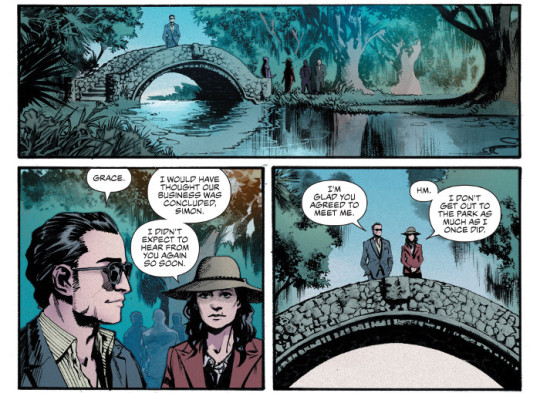

Brothers Dracul #5 circles back around to the beginning of the story, as we reach the end of this interesting retelling and interpretation of the intersection of both the historical and legendary story of Vlad the Impaler, from Cullen Bunn, Mirko Colak, Maria Santaolalla, and Simon Bowland. There’s an interesting twist here that certainly paints Vlad’s action in a different light, and I hope we see it followed up upon in a second series.
| Published by AfterShock

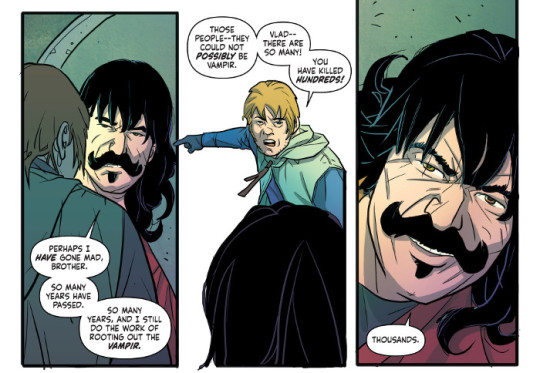

Cyber Force #5 is a nice change of pace as Bryan Hill, Matt Hawkins, Atilio Rojo, and Troy Peteri introduce us to another old familiar face. This incarnation of the team definitely is taking its time to be brought together, but when the storytelling is as entertaining and the artwork is as gorgeous as this, it doesn’t really matter. To note, though, this is not the kind of decompression that feels empty or padded, it’s just fleshing out characters and their lives more than what we’ve seen before.
| Published by Image / Top Cow



Daredevil Annual #1 presents a standalone story of Misty Knight’s days as a detective and her first meeting with Daredevil. It’s good. It feels a bit more like a pilot for a Misty Knight series than necessarily a Daredevil tale, but, as I said, it’s good. The art from Marcio Takara and Marcelo Maiolo is nice. I really like Takara’s style which gives me hints of Phil Hester, Jim Mahfood, and Tomm Coker.
| Published by Marvel

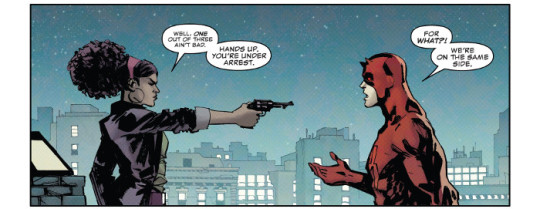

Dungeons & Dragons: Evil at Baldur’s Gate #5 is another fun one, with a focus this issue on Boo. I’ve really enjoyed this series, with Jim Zub giving the party a bit of a breather between larger adventures and giving a great look at them as individual characters. Great art, too, including this issue from Francesco Mortarino and Jordi Escuin.
| Published by IDW

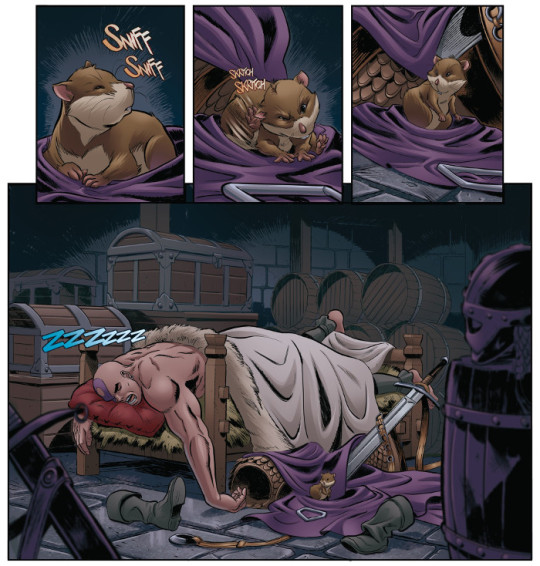

Edge of Spider-Geddon #2 gives us a view into another alternate Spiderverse, circling back around to SP//dr, and giving us a new twist on the power and responsibility rubric and VEN#m. It’s nice to see Lonnie Nadler and Zac Thompson play with more technological horror, with some incredible artwork from Alberto Alburquerque and Tríona Farrell.
| Published by Marvel



Euthanauts #2 is a thing of beauty. Nick Robles and Eva De La Cruz are seriously delivering some of the best art in comics right now with this series. The page layouts, character designs, use of colour, and incorporation of lettering choices from Aditya Bidikar, just elevate the storytelling immensely. Not even to mention how Tini Howard is making the weird science seamless in the dialogue. This is great.
| Published by IDW / Black Crown

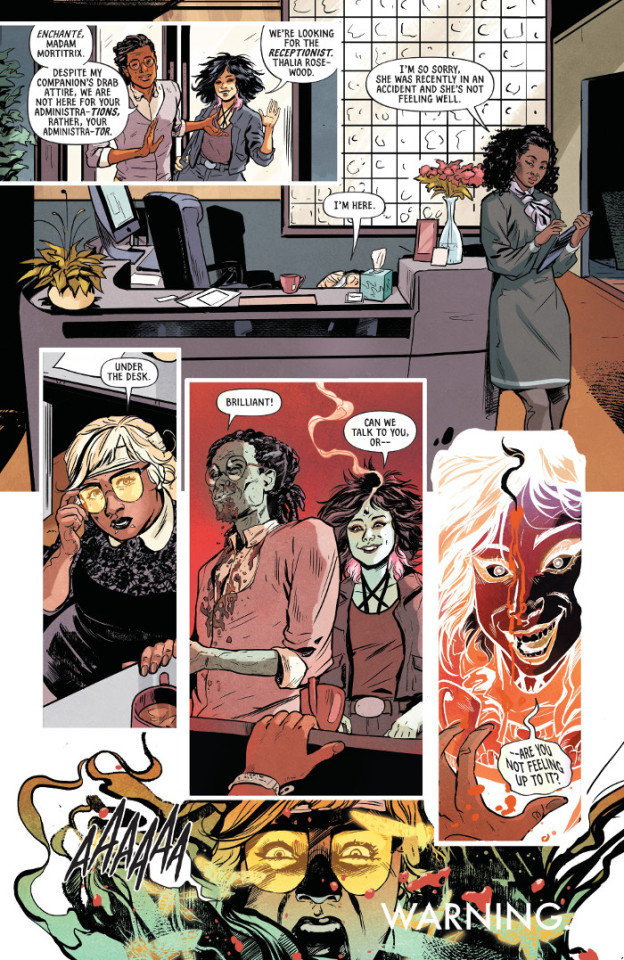

Exiles #7 concludes the Old West-ish arc with cowboy T’Challa. Drop dead gorgeous artwork from guest artist Rod Reis. His depiction of the ultimate villain here shows some nice influence from Bill Sienkiewicz.
| Published by Marvel



Extermination #2 brings the fight to the school, even as the team (and the reader, although it’s not a bad thing) is still confused as to what is really going on. I love this, the tension that Ed Brisson, Pepe Larraz, and Marte Gracia are building is palpable, and the hints of kid!Cable’s actions are chilling. Also, the art is just phenomenal.
| Published by Marvel

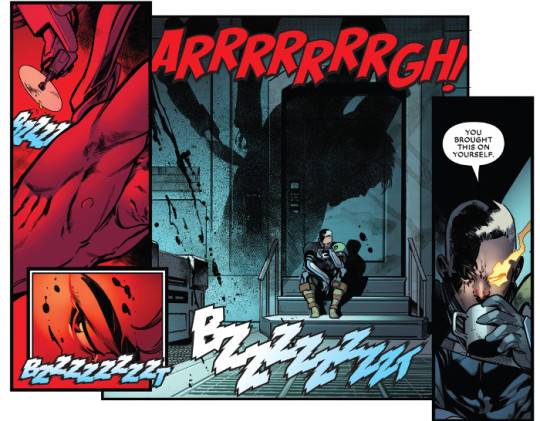

Harbinger Wars 2 #4 is kind of the end to this, but the ramifications and fallout are all supposed to appear in the Aftermath issue. That being said, Matt Kindt, Tomás Giorello, Renato Guedes, Diego Rodriguez, and Dave Sharpe go all out for the spectacle in this final confrontation between Livewire and X-O Manowar. It is still kind of insane how Capshaw could possibly consider what GATE and OMEN have done as being “good”, especially in light of Palmer going absolutely batshit insane, but it does lead to interesting set-up for future conflicts.
| Published by Valiant

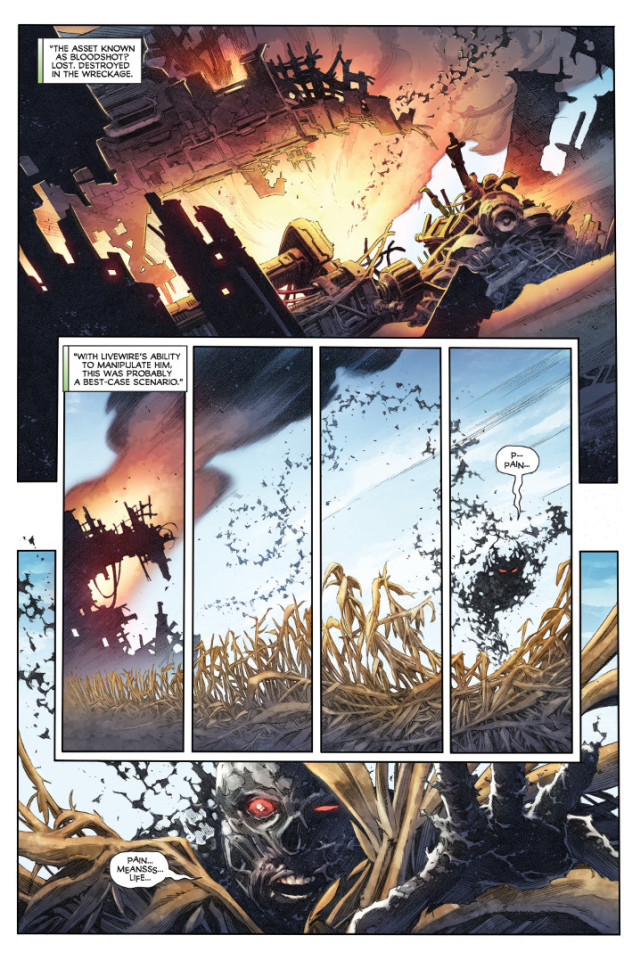

Hillbilly: Red-Eyed Witchery From Beyond #1 begins the next adventure of the black-eyed tramp. I get a bit of a Beowulf vibe from Eric Powell’s set-up and I’m interested to see where it goes. This series sees Powell passing on the artistic duties to Simone Di Meo, Brennan Wagner, and Warren Montgomery and it’s an interesting visual shift from the washes of Powell’s own work in the original series. I quite like Di Meo’s style, which reminds me a bit of James Harren and Troy Nixey.
| Published by Albatross Funnybooks



House Amok #1 is something I’m not sure I can describe. It’s kind of a family drama, but if that family were all collectively sharing a hallucinatory experience or delusion. It’s a very interesting concept that’s only partially revealed by Christopher Sebela, Shawn McManus, Lee Loughridge, and Aditya Baker, but it leads to a very compelling start here. Gorgeous artwork from McManus and Loughridge.
| Published by IDW / Black Crown

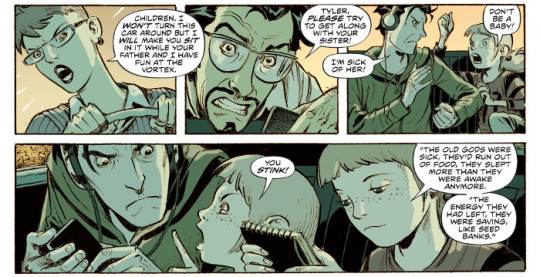

Hunt for Wolverine: Dead Ends #1, like all four of the Hunt for Wolverine mini-series, is kind of a bit of treading water. I cannot say it or any of the previous series are bad, taken on their own separated from this “event”, they’re usually quite good, but as a whole it’s kind of disappointing. It’s a search for Wolverine that kind of comes up empty, acting as a prequel to the return of Wolverine, despite already having returned in Marvel Legacy and hopped across numerous different titles, before apparently being used for evil, as per throwaway bits in the fourth issues of those previously mentioned minis that didn’t necessarily connect with the plots of those minis. It feels a bit scattered and unnecessary, unfortunately, especially when it comes to comparing notes, coming up with the organization we already knew was behind it, and a bit of hand-waving mystery and grandstanding that still tells us a whole lot of nothing. It’s sound and fury. All of which is a bit of a shame because I otherwise generally enjoy the work of Charles Soule and Ramon Rosanas.
| Published by Marvel



Isola #5... Just look at the artwork. Karl Kerschl and Msassyk just keep delivering page after page after page of beauty.
| Published by Image

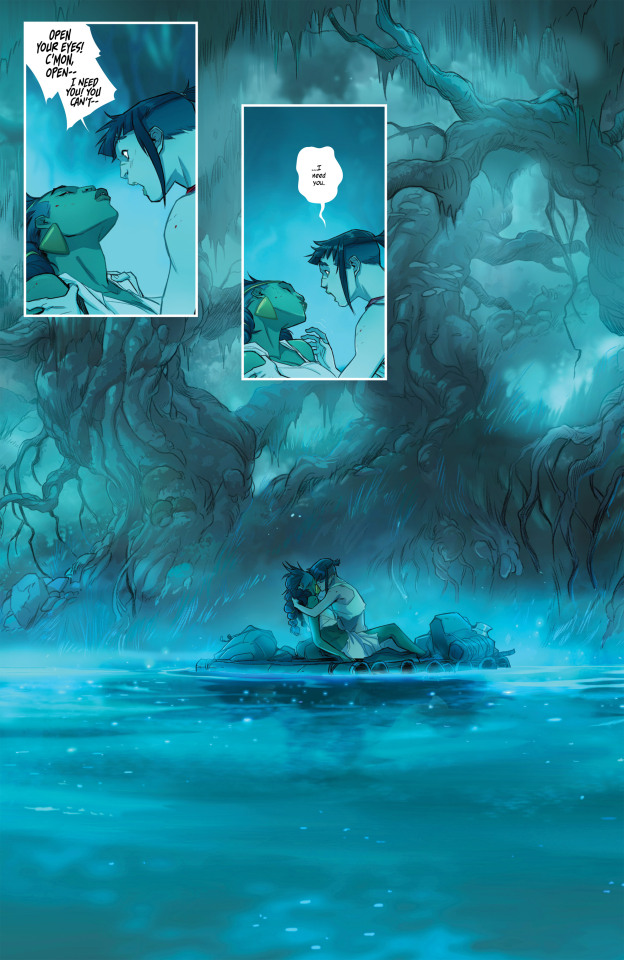

Jessica Jones #2 reaffirms that this is one of the best things that Marvel is currently publishing, with the next two chapters in this story. Kelly Thompson’s dialogue, narration, and banter throughout this issue is spot on, propulsive, and funny as hell when it needs to be, but what elevates it is that this isn’t your typical talking heads approach. The characters are doing stuff, like hunting sea monsters, instead of sitting at a desk or whatever. It’s a refreshing change that overall just makes this all the better. Not to mention Mattia De Iulis’ stunning artwork. It’s slick and polished with a line style that somewhat reminds me of Paul Gulacy and a bit of Rick Mays, and an approach to shadow and colour similar to Frazer Irving. This is a great series that really shouldn’t be missed.
| Published by Marvel



Judge Dredd: Under Siege #4 wraps up this entertaining series from Mark Russell, Max Dunbar, Jose Luis Rio, and Shawn Lee. I really like Dunbar’s take on Dredd and the Russell’s idea of people creating their own law in the absence of law is an interesting philosophical counterpoint to the idea of man naturally sliding towards a state of chaos. Even the mutants striving for society is an interesting challenge to the typical idea of things falling apart.
| Published by IDW



New Mutants: Dead Souls #6 concludes the series with Illyana putting the pieces together for what actually has been going on, it isn’t a pretty picture. This has been a great series from Matthew Rosenberg, Adam Gorham, Michael Garland, and Clayton Cowles and the revelations this issue are heavy. The implications for the X-universe is huge and I want more.
| Published by Marvel

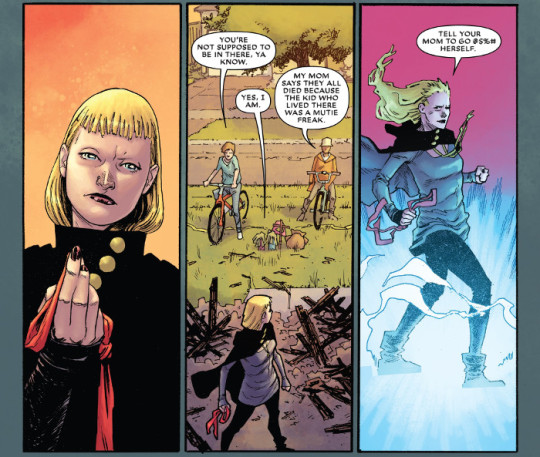

The New World #2 essentially reveals itself as a romance comic, amidst the ultraviolence and social engineering. Didn’t really see that coming, but it’s an interesting move. Trippy art from Tradd Moore, Heather Moore, and Ludwig Olimba.
| Published by Image



Paradise Court #2 continues to be an entertaining horror comic from Joe Brusha, Babisu Kourtis, Leonardo Paciarotti, and Taylor Esposito. This gives us the part of the story where our protagonist is experiencing the horror and everyone else is telling her she’s just imagining it, but it’s still well told and well illustrated.
| Published by Zenescope

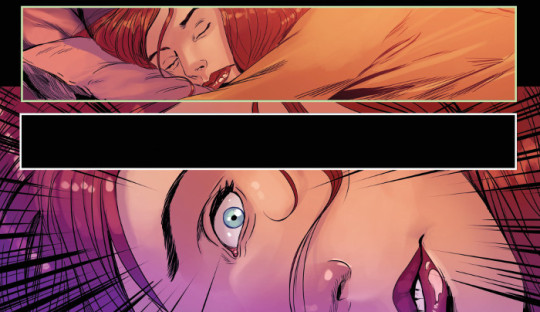

Rick and Morty vs. Dungeons & Dragons #1 is about as perfect a crossover of two properties as you can get. Morty trying to get into D&D because he thinks it will get him laid is the perfect in to the world of the game and the cartoon, perfectly blending the two for fans of both without alienating or diminishing either. Jim Zub, Patrick Rothfuss, Troy Little, Leonardo Ito, and Robbie Robbins are faithful to both and in doing so deliver a wonderful beginning to this story, that also educates along the way.
| Published by IDW & Oni Press

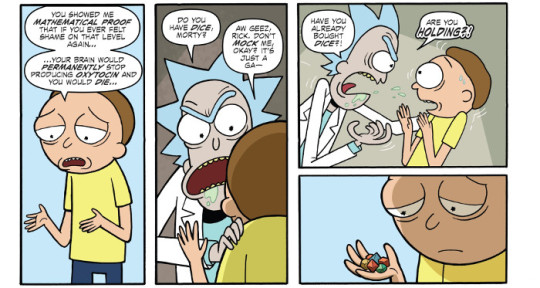

Runaways #12 is easily one of the best issues in what has already been an exemplary series. Rainbow Rowell, Kris Anka, Matthew Wilson, and Joe Carmagna focus here on forgiveness, acceptance, and second chances, with some truly beautiful character work between Gert & Victor and Nico & Karolina. If you don’t have a giant grin on your face by the end of the issue, I question your humanity.
| Published by Marvel



Submerged #2 is still weird, very weird, but there’s some really good bits in here demonstrating some of the emotional manipulation that family members sometimes employ. Beautiful, ethereal artwork from Lisa Sterle and Stelladia.
| Published by Vault

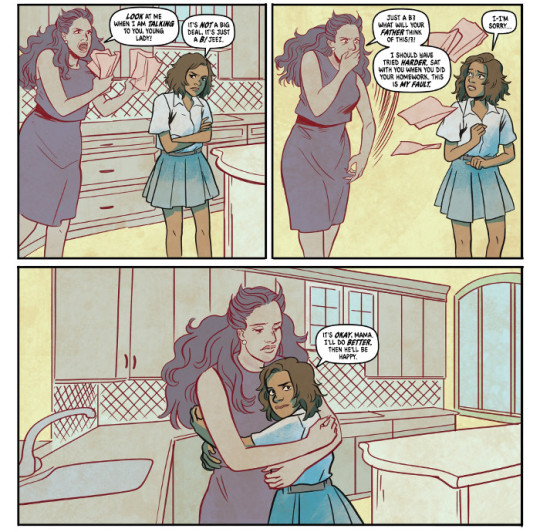

Venom: First Host #1 is somewhat strange to see in light of where Donny Cates and Ryan Stegman have taken the character, but this limited series from Mike Costa, Mark Bagley, Andrew Hennessy, Dono Sánchez-Almara, and Clayton Cowles serves as both an interesting addendum to the symbiote’s history and as a continuation (and likely capstone) to the previous creative team’s run. It’s pretty decent.
| Published by Marvel

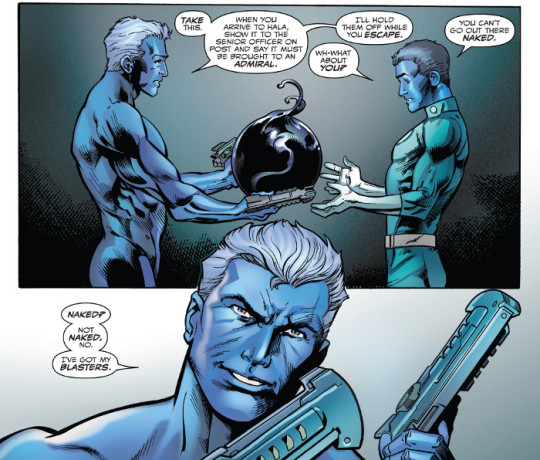

Web of Venom: Ve’Nam #1 is a one shot fleshing out the backstory of Rex Strickland and the SHIELD experiment that bonded the early symbiotes to soldiers set loose during the Vietnam War. It’s an entertaining tale with some nice guest stars and sweet art by Donny Cates, Juanan Ramírez, Felipe Sobreiro, and Clayton Cowles. I particularly like the scratchy, faded look in the art to make it look a bit “old”.
| Published by Marvel

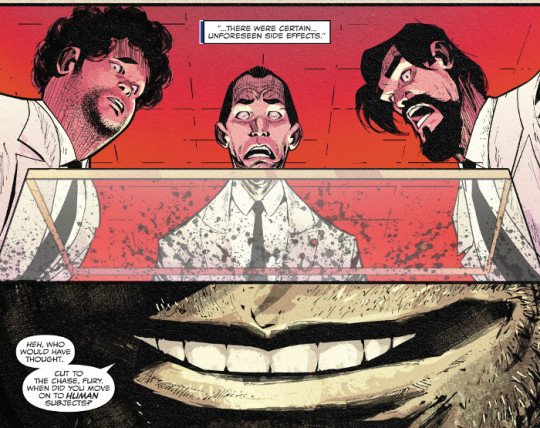

X-23 #3 is great. Mariko Tamaki has nailed the characters and the art from Juann Cabal and Nolan Woodard is incredible. The page designs alone elevate the storytelling immensely.
| Published by Marvel

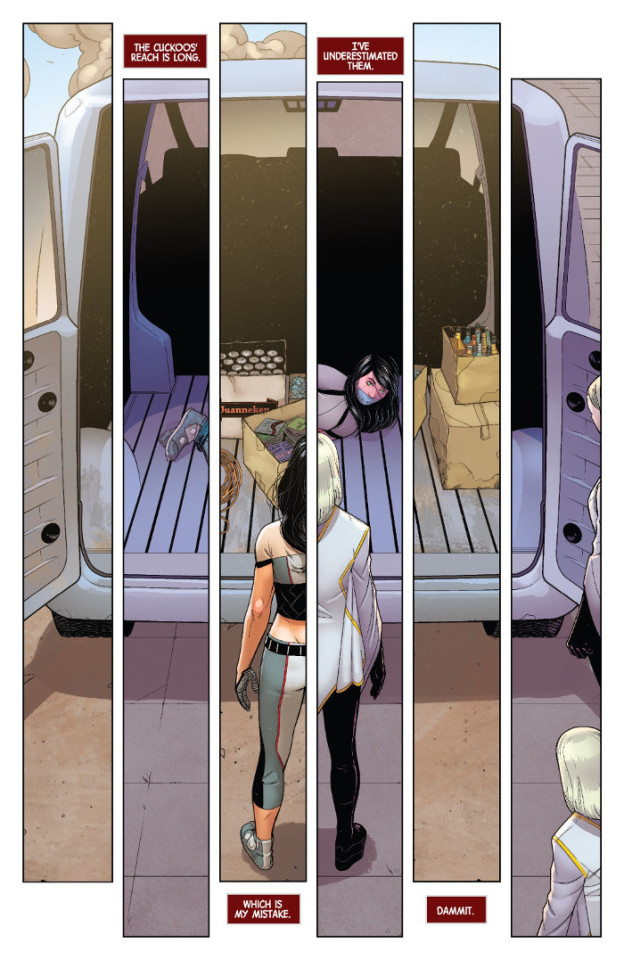

The X-Files: Case Files - Hoot Goes There? #2 concludes the second of this new approach of a series of mini-series and it’s...weird? Funny, but weird. Definitely taking a page out of some of the more outlandish episodes of the series, where you question whether or not what you saw happened actually happened. Still, it’s entertaining, which is all that really matters. Fun from Joe and Keith Lansdale, Silvia Califano, Valentina Pinto, and Shawn Lee.
| Published by IDW



X-Men Blue #34 looks like it largely serves as a capstone to Cullen Bunn’s work with Magneto over the past four years or so, as he winds down his run here and continues to tidy the characters up a bit before he’s done and hands the reins off to the next band of storytellers. It feels like there’s a lot more here that he would have like to have told, but what we get here is still excellent. The hints at the next stage for Magneto and mutantkind are intriguing. Great art from Marcus To and Matt Milla.
| Published by Marvel

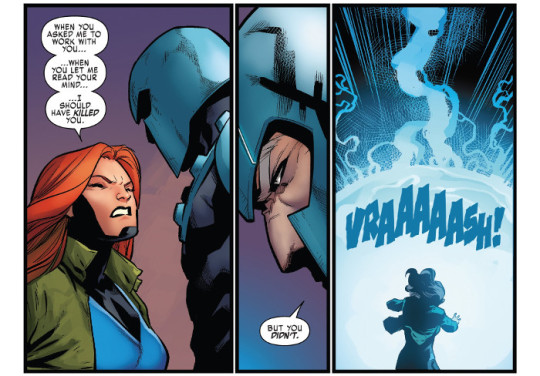

X-O Manowar #18 gives an interesting transition from this flashback of Aric’s pre-Shanhara life to his return to Earth, focusing on how ideas, people, and culture keeps changing. Matt Kindt delivers a pretty chilling reaction to it. All with some nice artwork from Trevor Hairsine, Brian Thies, and Diego Rodriguez.
| Published by Valiant

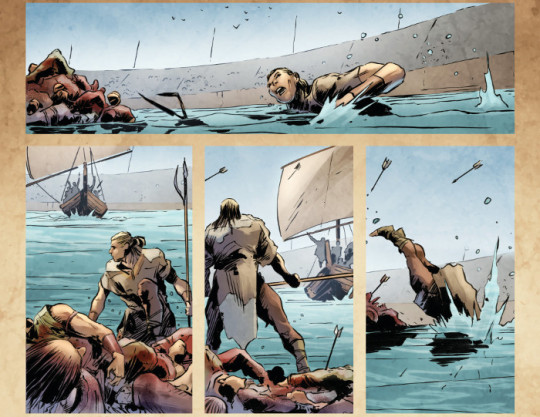

Other Highlights: Deadpool: Assassin #6, GI Joe: A Real American Hero #255, KINO #9, Marvel Two-in-One #9, Mighty Morphin Power Rangers: Shattered Grid #1, Modern Fantasy #3, Moon Knight #198, Ms. Marvel #33, Red Sonja #20, Rick & Morty #41, StarCraft: Scavengers #2, Star Wars: Lando - Double or Nothing #4, Star Wars: Poe Dameron Annual #2, Star Wars Adventures #13, TMNT: Bebop & Rocksteady Hit the Road #5, Wayward #28, X-Men: Grand Design - Second Genesis #2
Recommended Collections: 2021 - Volume 1, 30 Days of Night, Big Trouble in Little China: Old Man Jack - Volume 1, Black Cloud - Volume 2: No Return, DuckTales Classics - Volume 1, Eugenic, Factory, Femme Magnifique, I Hate Fairyland - Volume 4, James Bond: Hammerhead, Judas, Killer Instinct, Stray Bullets: Sunshine & Roses - Volume 2

d. emerson eddy is not the very model of a modern major general. Nor a scientist salarian for that matter.
9 notes
·
View notes
Quote
SHOP NOW Drop Stop - The Original Patented Car Seat Gap Filler (AS SEEN ON Shark Tank) - Set of 2 by Drop Stop 4.7 out of 5 stars 9,146 ratings | 370 answered questions Price:$19.99 + $118.68 Shipping & Import Fees Deposit to Bangladesh Details WE ARE THE ONLY SOLUTION WITH 100% GAP COVERAGE - IN FRONT OF, SURROUNDING, AND BEHIND SEAT BELT CATCH. Drop Stop attaches to the seat belt catch via built in slot; moves with the seat and no need to readjust or reinstall. AS SEEN ON TV/SHARK TANK, Drop Stop blocks that annoying yet ever so dangerous gap between your car or truck seat and center console BEWARE OF CHEAP KNOCKOFFS AND COUNTERFEITERS!!! IF IT DOESN'T SAY DROP STOP ON IT, THEN DON'T BUY IT! Drop Stop is the Original and Patented Car Seat Gap Filler. Every other product that claims to fill the gap works poorly, or not at all. Drop Stop will never fall apart and lasts a lifetime! Each package comes with 2 Drop Stops (1 for the driver side and 1 for the passenger side; universal fit), a Slide Free Pad and an LED Credit Card Light One size fits most vehicles! High Grade Neoprene casing allows Drop Stop to contract or expand to whatever size gap you have. One color blends all! The Gap is always a dark shadow so once you install Drop Stop, you won't know it's there until it Stops the Drop! SHOP NOW ------------------------------------------------------------------------------------------------------------------------------------------------------ SHOP NOW Munchkin Brica Elite Seat Guardian Car Seat Protector, Crash Test Approved, Dark Grey, 1 Pack by Munchkin 4.7 out of 5 stars 2,295 ratings | 192 answered questions Amazon'sChoicefor "brica car seat protector" List Price:$36.99 Price:$34.95 + $155.96 Shipping & Import Fees Deposit to Bangladesh Details You Save:$2.04 (6%) The product measures 45 inch Length x 20 inch Width. Color safe construction won't bleed onto upholstery Dual grip traction technology grips on both sides to help minimize unwanted car safety seat movement Rear facing kick mat provides complete seat back coverage. Vinyl material Unique one piece design is compatible with all car seats Easy clean grime guard fabric protects your car › See more product details SHOP NOW ------------------------------------------------------------------------------------------------------------------------------------------------------ ------------------------------------------------------------------------------------------------------------------------------------------------------ SHOP NOW Shynerk Baby Car Mirror, Safety Car Seat Mirror for Rear Facing Infant with Wide Crystal Clear View, Shatterproof, Fully Assembled, Crash Tested and Certified by Shynerk 4.8 out of 5 stars 6,124 ratings | 51 answered questions #1 Best Seller in Rear Facing Car Seat Mirrors Price:$20.99 + $122.15 Shipping & Import Fees Deposit to Bangladesh Details 1.EXTRA WIDE CRYSTAL CLEAR REFLECTION AND 360 DEGREE ADJUSTABLE: Full 360 degree easily pivot to your desired viewing angle, it allows EXTRA WIDE CRYSTAL CLEAR REFLECTION AND 360 DEGREE ADJUSTABLE: Full 360 degree easily pivot to your desired viewing angle, it allows you to keep your lovely baby in sight and look good after him or her all the time to keep your lovely baby in sight and look good after him or her all the time. 2.SAFETY CERTIFIED and CRASH TESTED: Design of Shatterproof Acrylic Glass, strongly tied up by heavy duty straps,full rotation with hinge, in the event of a Crash or Accident you can make sure of your baby's safety. 3.EASY TO TIGHTEN STRAPS: Easy straps to your moveable headrest and give you an unbreakable 360 degree swivel travel. 4.FITS MOST CARS, TRUCKS, VANS SUVs AND ANY PLACE OF BACK SEAT. Provides you perfect view. 5.SHYNERK BABY MIRROR: If you find anything wrong with your baby mirror, do not hesitate to let us know and we will take care of it. Your pleasure is paramount. SHOP NOW ------------------------------------------------------------------------------------------------------------------------------------------------------ ------------------------------------------------------------------------------------------------------------------------------------------------------ SHOP NOW NOCO GENIUS1, 1-Amp Fully-Automatic Smart Charger, 6V And 12V Battery Charger, Battery Maintainer, And Battery Desulfator With Temperature Compensation by NOCO 4.5 out of 5 stars 493 ratings | 143 answered questions #1 Best Seller in Battery Chargers List Price$39.95 With Deal:$25.49 + $94.74 Shipping & Import Fees Deposit to Bangladesh Details You Save:$14.46 (36%) Meet the genius1 - similar to our g750, just better. It's 35% smaller and delivers 35% more power. It's the all-in-one solution - battery charger, battery maintainer, trickle charger, plus battery desulfator. Do more with genius - designed for 6-volt and 12-volt lead-Acid automotive, marine, and deep-cycle batteries, including flooded, gel, AGM, and maintenance-free, plus lithium-ion batteries. Enjoy precision charging - an integrated thermal sensor detects the ambient temperature and alters the charge to eliminate over-charging in hot climates and under-charging in cold climates. Charge dead batteries - charges batteries as low as 1-volt. Or use the all-new force mode that allows you to take control and manually begin charging dead batteries down to zero volts. Restore your battery - automatically detects battery sulfation and acid stratification to restore lost battery performance for stronger engine starts and extended battery life. Beyond maintenance - It's not just a trickle charger, it's an advanced battery maintainer. A fully-automatic, worry-free battery charger for everyday use - 24/7 - with zero overcharge. Compatible with all types of vehicles - charge and maintain cars, motorcycles, lawnmowers, atvs, tractors, trucks, suvs, boats, classic cars, hot rods, and more - you name it. SHOP NOW
http://dstorebd.blogspot.com/2020/06/amazon-automotive-product-2020.html
0 notes
Text
FIVE THINGS FUTURE DC FILMS SHOULD BORROW FROM WONDER WOMAN
Five things future DC films should borrow from Wonder Woman
by Kwame Opam@kwameopam via theverge.com
Wonder Woman had an arduous task to pull off on its way to the box office. As the fourth entry in the DC Extended Universe film franchise, it needed to succeed where Man of Steel, Batman v Superman, and Suicide Squad each failed by being dour, poorly made, and overly violent. It also needed to be the first blockbuster starring a female superhero to land at the box office, proving decades of skepticism wrong in the process. It’s an unenviable position to be in, but the film was a success despite its underdog status, making its record-breaking $100.5 million debut in North America and critical acclaim that much more astounding. Wonder Woman was a trailblazer for female heroes in comics, and now she’s a trailblazer at the movies.
Wonder Woman’s theatrical success is no accident. Unlike its cinematic cousins, Wonder Woman is cleaner, more fun, and more sure of itself in ways that we should demand from our superhero movies. Marvel and DC, it’s time to take notes.
IT HAS CLEAR STORY
BvS and Suicide Squad have a whole host of problems shared between them, but the most egregious issues relate to their muddled, often nonsensical narratives. Superheroes don’t exist in worlds that look a whole lot like our own, what with the flying people and aliens with eye lasers, but their stories should adhere to some kind of internal logic that keeps viewers invested beyond the spectacle. So it’s frustrating when these tentpoles revolve around stories that, say, pit Batman against Superman because Lex Luthor happens to hate Superman because of undercooked father issues that have nothing to do with Batman. Or when the shrewd, ruthless Amanda Waller thinks a guy who’s really good with guns and a woman in clown makeup can take on a being who can survive a nuclear blast.
‘WONDER WOMAN’ SATISFIES BECAUSE IT MOSTLY MAKES SENSE
Wonder Woman, on the other hand, is satisfying because it makes sense. Or as much sense as a movie inspired by a pulp story written for children in the 1940s can, anyway. Diana of Themyscira is raised among a race of women warriors bred to keep the world safe from war. War comes to the shores of Themyscira. Diana takes it upon herself to fulfill her duty and save the world. She soon discovers that the world is far more complicated than she ever knew, but she grows enough to believe that the world is still worth saving. That’s as straightforward a story as you can get, and it leaves plenty of room for introspection, nuance, and action that pulls viewers right into Diana’s world.
IT ISN’T OVER-STYLIZED
Much has already been said about the DCEU cinematic aesthetic. Man of Steel and Batman v Superman director Zack Snyder loves spectacle — so much so that some of his scenes in movies like 300 don’t feel so much like moments as splash panels lifted directed from the source comic. Those choices plagued his DCEU movies, while the choices made in David Ayer’s Suicide Squad blended gritty, grimy action with Day-Glo colors, making for a confused visual experience.
Wonder Woman is certainly stylized when it wants to be. The numerous slow-motion shots of the Amazons and Diana herself come right out of the Snyder stylebook. But when the film takes a step back to let them be awesome on-screen, fighting on horseback or taking artillery shells head-on, it’s that much more thrilling.
IT’S FUNNY
This is an area where Wonder Woman is not only leaps and bounds ahead of the DCEU’s previous films, but where it’s also able to give some of the films in the Marvel Cinematic Universe a run for their money. The film is intermittently hilarious, thanks in large part to the chemistry and comic timing of Gal Gadot and Chris Pine.
GAL GADOT AND CHRIS PINE HAVE GREAT COMIC TIMING
Where a film like Guardians of the Galaxy is able to mine laughs out of the Guardians’ screwy family dynamic, Gadot’s Diana and Pine’s Steve Trevor are two worlds colliding in the funniest possible ways. There are several moments where the movie seems to acknowledge that Diana, warrior princess, coming to man’s world is a patently silly concept, but the movie betrays so much affection for her and the people around her that the silliness brings laughs and real smiles. Especially when it comes to Steve trying — and failing — to gently undermine Diana, and Diana doing whatever she wants to do anyway.
IT’S SURPRISINGLY DIVERSE
The superhero genre has always been deeply white and male, and creators have struggled to change that, even in this franchise era when seemingly any superhero, no matter how obscure, can get a movie. (Remember Jonah Hex?) Wonder Woman, as the character’s first ever solo theatrical movie and the first female superhero movie since 2005’s awful Elektra, was always going to be a standard-bearer for women in the tights-and-capes crowd. But, given that Wonder Woman has become a modern pop-culture symbol for all women, the specter of white feminism meant that it needed to include people of color in a way that other films in its genre didn’t.
Thankfully, the movie manages to pull this off. The Amazons are formidable warrior women with a variety of skin tones, and they’re never sexualized for leering viewers. London (or what we see of it, anyway) is similarly diverse. And Diana’s comrades in arms include two actors of color, Saïd Taghmaoui and Eugene Brave Rock. Is the movie perfect on this front? No. After leaving Themyscira, the movie fails to really center the story of any female character beyond Diana’s own, and Doctor Poison (Elena Anaya) is woefully underutilized. But what’s there works so well that it’s a little hard to find fault in the shortcomings.
IT’S REFRESHINGLY SINCERE
On their way to the front lines, Diana and Steve pass by an ice-cream vendor. He buys her a scoop, and she eats it with such visible delight that she tells the vendor he should be very proud. It’s an affecting moment, because it strikes at two things that make Wonder Woman a great character. First, she’s able to see more clearly than anyone around her that there’s good in the world. Second, she believes that such goodness is worth defending. In just an instant, we get a clear glimpse at what drives her, and that instant is more joyful and sincere than anything the DCEU has offered to fans until now.
‘WONDER WOMAN’ IS SINCERE IN A WAY THE OTHER DCEU FILMS AREN’T
That sincerity is a far cry from the cynicism and existential anguish in all three previous DCEU films. Oh, Diana certainly has to grapple with what it means to be a hero in man’s world. But she knows what she believes, and arrives at a place where she can defend the world she loves, while still knowing there are things to be cynical about. In other words, she’s miles ahead of Batman and Superman in being the kind of hero that children have idolized for nearly a century.
#wonderwoman#DCcomics#films#storytelling#manofsteel#batman#superman#sucidesquad#superhero#female#boxoffice#hit#right#sincere#woman
0 notes
Text
eyyy it’s Easter, have some religious headcanons:
in all verses except Poke, Poppy was raised Catholic. Her immediate family is not too devout, only her mother goes to church on the major holidays and sometimes on Sundays and in general even the holidays are largely secular. Poppy herself will claim to “not know or care whether a higher power exists” and doesn’t particularly care to bother with any religious tradition, although in JAPANAU, she’ll go to shrines and follow protocol in an attempt to integrate with Japanese society at large.
Pokemon, though...: I will preface this by saying I ALWAYS saw Pokemon as polytheistic, sometimes even PANtheistic, and I also NEVER saw Arceism as a Christianity parallel like the rest of the fandom seems to. It just makes no sense with what we see with the rest of the Pokemon Universe (created by Japan, who, with their mixed Shinto and Buddhist history are not likely to have ANY Abrahamic religious themes in their work at all)
I also assume who worships what is probably skewed a bit by the region they’re from, but of course outliers exist.
Atheism is more along the lines of “I don’t think these are GODS, just super powerful Pokemon”, rather than “they don’t exist” because? we have dex entries? not believing in their existence at all makes no sense to me. I also HC that Christmas and other real world holidays are celebrated in a secular fashion in regions where it’s applicable.
Any whoodle
Poppy’s family was raised in the Deities of Fiore: The options there were the Legendary Beasts and possibly Manaphy. THEIR parents “converted” to the Unovan pantheon in an attempt to assimilate, but her parents stuck to their roots. I quote converted because I see Pokemon religion as 1. Highly individual in how people worship, 2. Most people probably just go to shrines/places of worship and don’t do much beyond celebrating the thing the deity they chose to pay respects to’s specific theme.
As for Poppy’s family, they stuck to the Fioran roots in adolescence and then mellowed into realizing it was dumb rebellion. They largely give prayers to Victini, due to what it represents. Her sister also tosses a few donations towards Meloetta sometimes.
Poppy is a devout worshipper of Mew. Mew symbolizes fertility, is the genetic ancestor of all Pokemon, the first Psychic, and thus, a PARENT. Given Poppy’s history with her family, Mew is the deity of choice for her.
Her religion is a hodgepodge of Shintoism (bc mew is from kanto aka japan), and wicca. The specifics:
She has the traditional altar in the house, a blend of the Shinto kamidana and wiccan/pagan altar. Her symbol for Mew is an Ankh, because fertility and life. The Shinto tenet of cleanliness is absolute - being a medical professional means everything has to be sterile anyway so it’s easy to slot this belief and practice into her life. Offerings are usually symbols of fertility like, oh say, eggs. She mostly follows Shinto protocol in terms of how to pray/how offerings are given, etc. The wiccan half manifests in Dianic Wicca: Mew is the Mother Goddess. The magic that would be present in Wicca here is replaced by Psychic powers, and Poppy practices hers on the daily.
Procreation is important - but Mew didn’t give birth from traditional means, so building a family however you manage is what counts. Mew is also considered, to Poppy at least, a Female Deity, so, yeah, f/f sexuality is encouraged. Mew’s symbolic meaning as a mother means you should fulfill your duty as being whatever you believe to be the Archetypal Nurturer (keep in mind that this is how POPPY practices. What each person considers to BE procreating and nurturing etc is gonna change by person to person - as is whether they even gender Mew at all.)
Finally, Mew gave live birth (in the games, and this is game canon on this blog) but the child was a clone. Science and technology made that miracle possible. So it’s very important to her to be as scientifically literate as possible and kept up to date on all the new things etc. Tech is a good thing and should be embraced and accepted, especially medical tech.
Holiday wise, she celebrates all secular Unovan holidays the Unovan (read: American) way. Some have Fioran/Italian-American/Unovan variations and for those she goes with those customs instead. Other than that she celebrates all fertility holidays by going to a Mew shrine if she can and tossing stuff in the donation box. There’s a specific abandoned one in Saffron she likes to visit. Failing that, she prays to the house altar.
0 notes